| Listing 1 - 10 of 17 | << page >> |
Sort by
|
Periodical
Abstract | Keywords | Export | Availability | Bookmark
 Loading...
Loading...Choose an application
- Reference Manager
- EndNote
- RefWorks (Direct export to RefWorks)
Flavor --- Odors --- Smell --- Saveur --- Odeurs --- Odorat --- Olfaction --- Aromas --- Fragrances --- Scents --- Smells --- Tastes --- Chemical senses --- Senses and sensation --- Nose --- Sensory evaluation --- Food --- Taste --- Analysis --- Odours
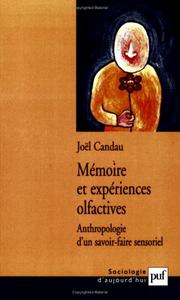
ISBN: 2130511406 9782130511403 Year: 2000 Publisher: Paris Presses Universitaires de France
Abstract | Keywords | Export | Availability | Bookmark
 Loading...
Loading...Choose an application
- Reference Manager
- EndNote
- RefWorks (Direct export to RefWorks)
Smell --- Odors --- Social aspects --- Reukzin --- Neurologie --- Geheugen --- Antropologie --- Odorat --- Mémoire --- Anthropologie --- Olfaction --- Chemical senses --- Senses and sensation --- Nose --- Aromas --- Fragrances --- Scents --- Smells --- Sensory evaluation --- Odours --- Smell - Social aspects --- Odors - Social aspects
Book
ISBN: 9781509536788 9781509536771 1509536779 1509536787 Year: 2020 Publisher: Cambridge Polity Press
Abstract | Keywords | Export | Availability | Bookmark
 Loading...
Loading...Choose an application
- Reference Manager
- EndNote
- RefWorks (Direct export to RefWorks)
"Why is our sense of smell so under-appreciated? We tend to think of smell as a vestigial remnant of our pre-human past, doomed to gradual extinction, and we go to great lengths to eliminate smells from our environment, suppressing body odour, bad breath and other smells. Living in a relatively odour-free environment has numbed us to the importance that smells have always had in human history and culture. In this major new book Robert Muchembled restores smell to its rightful place as one of our most important senses and examines the transformation of smells in the West from the Renaissance to the beginning of the 19th century. He shows that in earlier centuries, the air in towns and cities was often saturated with nauseating emissions and dangerous pollution. Having little choice but to see and smell faeces and urine on a daily basis, people showed little revulsion ; until the 1620s, literature and poetry delighted in excreta which now disgust us. The smell of excrement and body odours were formative aspects of eroticism and sexuality, for the social elite and the popular classes alike. At the same time, medicine explained outbreaks of plague by Satan's poisonous breath corrupting the air. Amber, musk and civet came to be seen as vital bulwarks against the Devil's breath : scents were worn like armour against the plague. The disappearance of the plague after 1720 and the sharp decline in fear of the Devil meant there was no longer any point in using perfumes to fight the forces of evil, paving the way for the olfactory revolution of the 18th century when softer, sweeter perfumes, often with floral and fruity scents, came into fashion, reflecting new norms of femininity and a gentler vision of nature. This rich cultural history of an under-appreciated sense will be appeal to a wide readership." -- Back cover. "A rich cultural history of smells that sheds new light on an under-appreciated sense."--
Odors --- Smell --- Civilization, Modern. --- Social aspects --- History. --- Europe --- Civilization. --- Civilization, Modern --- History --- Modern civilization --- Modernity --- Civilization --- Renaissance --- Olfaction --- Chemical senses --- Senses and sensation --- Nose --- Aromas --- Fragrances --- Odours --- Scents --- Smells --- Sensory evaluation
Book
ISBN: 0444801030 Year: 1979 Publisher: Elsevier
Abstract | Keywords | Export | Availability | Bookmark
 Loading...
Loading...Choose an application
- Reference Manager
- EndNote
- RefWorks (Direct export to RefWorks)
Animal ethology and ecology. Sociobiology --- Pheromones --- Animal communication --- Insect sex attractants --- Odors --- Odeurs --- Congresses --- Congrès --- Congrès --- Animal chemical ecology --- Hormones --- Semiochemicals --- Sex recognition (Zoology) --- Aromas --- Fragrances --- Scents --- Smells --- Sensory evaluation --- Smell --- Insects --- Sex attractants, Insect --- Insect baits and repellents --- Animal ecology --- Chemical ecology --- Sex attractants --- Congresses. --- Odours --- Ecology. --- Communication --- Insect --- Molecular structure-biological activity relationship --- Odor and odorous substances --- Olfaction
Book
ISBN: 2876860163 9782876860162 Year: 1988 Publisher: Paris Bourin
Abstract | Keywords | Export | Availability | Bookmark
 Loading...
Loading...Choose an application
- Reference Manager
- EndNote
- RefWorks (Direct export to RefWorks)
Odors --- Perfumes --- Odeurs --- Parfums --- Social aspects --- Aspect social --- Smell --- History --- Odors. --- Smell. --- -Olfaction --- Chemical senses --- Senses and sensation --- Nose --- Aromas --- Fragrances --- Scents --- Smells --- Sensory evaluation --- Sense of Smell --- Olfaction --- Smell Sense --- Olfactometry --- Odor --- Social aspects. --- Odorants. --- Odorants --- Odorant --- -Social aspects. --- Aroma --- Fragrance --- Scent --- Odours --- Odors - History --- Odors - Social aspects --- Smell - History
Periodical
Abstract | Keywords | Export | Availability | Bookmark
 Loading...
Loading...Choose an application
- Reference Manager
- EndNote
- RefWorks (Direct export to RefWorks)
Aromatherapy --- Aromatic plants --- Essences and essential oils --- Complementary Therapies. --- Odors. --- Oils, Volatile --- Plant Oils --- Aromatherapy. --- Therapeutic use --- therapeutic use. --- Therapeutic use. --- Aroma therapy --- Odors --- Odor --- Odorant --- Alternative Therapies --- Therapy, Alternative --- Therapy, Complementary --- Alternative Medicine --- Complementary Medicine --- Medicine, Alternative --- Medicine, Complementary --- Therapies, Alternative --- Therapies, Complementary --- Aromatic plant products --- Essential oils --- Volatile oils --- Massage therapy --- Terpenes --- Vegetable oils --- Plants --- Flowers --- Fragrant gardens --- Odorants. --- Aroma --- Fragrance --- Scents --- Aromas --- Fragrances --- Scent
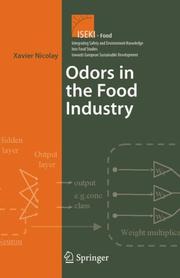
ISBN: 128072434X 9786610724345 0387341242 0387335102 1441941339 Year: 2006 Volume: v. 2 Publisher: [New York] : Springer,
Abstract | Keywords | Export | Availability | Bookmark
 Loading...
Loading...Choose an application
- Reference Manager
- EndNote
- RefWorks (Direct export to RefWorks)
The ISEKI-Food book series is a collection where various aspects of food safety and environmental issues are introduced and reviewed by scientists specializing in the field. In all of the books a special emphasis is placed on including case studies applicable to each specific topic. The books are intended for graduate students and senior level undergraduate students as well as professionals and researchers interested in food safety and environmental issues applicable to food safety. "ISEKI-Food" is an acronym for "Integrating Safety and Environmental Knowledge Into Food Studies". Participants in the ISEKI-Food network, coordinated by Professor Cristina Silva at The Catholic University of Portugal, come from 29 countries in Europe and most of the institutes and universities involved with Food Science education at the university level in Europe are represented. Some international companies and non teaching institutions have also participated in the network. The main objectives of ISEKI-Food are to improve the harmonization of studies in food science and engineering in Europe and to develop and adapt food science curricula emphasizing the inclusion of safety and environmental topics. Odors in the Food Industry, the second volume of the ISEKI-Food book series, discusses the diverse questions raised by odors in the food industry and the closely related Volatile Organic Compounds. Topics range from perception of the issue to implementation of regulations, from prevention of the problems to their possible treatment, through specific case studies and analysis methods illustrating the different measurement technologies. The goal is to raise future industrial decision-makers’ awareness in odors and air pollution problems and present the appropriate tools to better apprehend and manage odors problems, should they ever be confronted with this type of situation whether as a victim or as a liable actor. About the Editor Xavier Nicolay is a head researcher at the environmental department at the Institut Meurice in Brussels, Belgium. About the Series Editor Kristberg Kristbergsson is Professor of Food Science at the Department of Food Science and Human Nutrition at the University of Iceland, Iceland. .
Food industry and trade --- Odors. --- Environmental aspects. --- Aromas --- Fragrances --- Scents --- Smells --- Sensory evaluation --- Smell --- Food --- Food preparation industry --- Food processing --- Food processing industry --- Food technology --- Food trade --- Agricultural processing industries --- Processed foods --- Processing --- Food science. --- Environmental sciences. --- Food Science. --- Environment, general. --- Environmental science --- Science --- Food—Biotechnology. --- Environment. --- Balance of nature --- Biology --- Bionomics --- Ecological processes --- Ecological science --- Ecological sciences --- Environment --- Environmental biology --- Oecology --- Environmental sciences --- Population biology --- Ecology
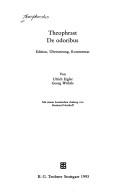
ISBN: 3519074869 3598774869 3110950464 Year: 1993 Volume: 37 Publisher: Stuttgart Teubner
Abstract | Keywords | Export | Availability | Bookmark
 Loading...
Loading...Choose an application
- Reference Manager
- EndNote
- RefWorks (Direct export to RefWorks)
Botany --- Odors --- Senses and sensation --- Botanique --- Odeurs --- Sens et sensations --- Pre-Linnean works --- Ouvrages prélinnéens --- -Botany --- -Botanical science --- Phytobiology --- Phytography --- Phytology --- Plant biology --- Plant science --- Biology --- Natural history --- Plants --- Sensation --- Sensory biology --- Sensory systems --- Knowledge, Theory of --- Neurophysiology --- Psychophysiology --- Perception --- Aromas --- Fragrances --- Scents --- Smells --- Sensory evaluation --- Smell --- Early works to 1800. --- Early works to 1800 --- -Early works to 1800. --- Pre-Linnaean works of botany --- Pre-Linnean works of botany --- Ouvrages prélinnéens --- Odours
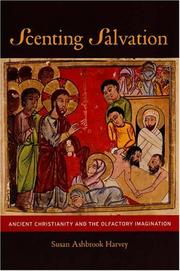
ISBN: 9780520241473 0520241479 Year: 2006 Volume: 42 Publisher: Berkeley University of California press
Abstract | Keywords | Export | Availability | Bookmark
 Loading...
Loading...Choose an application
- Reference Manager
- EndNote
- RefWorks (Direct export to RefWorks)
This book explores the role of bodily, sensory experience in early Christianity (first - seventh centuries AD) by focusing on the importance of smell in ancient Mediterranean culture. Following its legalization in the fourth century Roman Empire, Christianity cultivated a dramatically flourishing devotional piety, in which the bodily senses were utilized as crucial instruments of human-divine interaction. Rich olfactory practices developed as part of this shift, with lavish uses of incense, holy oils, and other sacred scents. At the same time, Christians showed profound interest in what smells could mean. How could the experience of smell be construed in revelatory terms? What specifically could it convey? How and what could be known through smell? Scenting Salvation argues that ancient Christians used olfactory experience for purposes of a distinctive religious epistemology: formulating knowledge of the divine in order to yield, in turn, a particular human identity. Using a wide array of Pagan, Jewish, and Christian sources, Susan Ashbrook Harvey examines the ancient understanding of smell through religious rituals, liturgical practices, mystagogical commentaries, literary imagery, homiletic conventions; scientific, medical, and cosmological models; ascetic disciplines, theological discourse, and eschatological expectations. In the process, she argues for a richer appreciation of ancient notions of embodiment, and of the roles the body might serve in religion.
Smell --- Senses and sensation --- Odors. --- Worship. --- Sacrifice. --- Religious aspects --- Christianity --- History. --- Odorat --- Sens et sensations --- Odeurs --- Cultes --- Sacrifice --- Aspect religieux --- Christianisme --- Histoire --- Odors --- Worship --- Cult --- Cultus --- Religion --- Theology, Practical --- Fire-worshipers --- Olfaction --- Chemical senses --- Nose --- Burnt offering --- Sensation --- Sensory biology --- Sensory systems --- Knowledge, Theory of --- Neurophysiology --- Psychophysiology --- Perception --- Aromas --- Fragrances --- Scents --- Smells --- Sensory evaluation --- Religious aspects&delete& --- Christianity&delete& --- History --- Odours --- Smell - Religious aspects - Christianity - History. --- Senses and sensation - Religious aspects - Christianity - History.
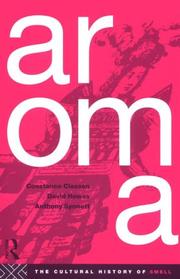
ISBN: 041511473X 0415114721 Year: 1994 Publisher: London : Routledge,
Abstract | Keywords | Export | Availability | Bookmark
 Loading...
Loading...Choose an application
- Reference Manager
- EndNote
- RefWorks (Direct export to RefWorks)
Parfums --- Odeurs --- Odorat --- Histoire --- 316.7 --- 316.77 --- #SBIB:316.7C120 --- #SBIB:309H53 --- #SBIB:309H040 --- Cultuursociologie --(algemeen) --- Communicatiesociologie --- Cultuursociologie: algemene en theoretische werken --- Niet-verbale communicatie --- Populaire cultuur algemeen --- Odors --- Smell --- Social history. --- History. --- 316.77 Communicatiesociologie --- 316.7 Cultuursociologie --(algemeen) --- Senses and sensation --- Social aspects. --- History --- Social history --- Descriptive sociology --- Social conditions --- Sociology --- Olfaction --- Chemical senses --- Nose --- Aromas --- Fragrances --- Scents --- Smells --- Sensory evaluation --- Histoire. --- Odours
| Listing 1 - 10 of 17 | << page >> |
Sort by
|

 Search
Search Feedback
Feedback About UniCat
About UniCat  Help
Help News
News